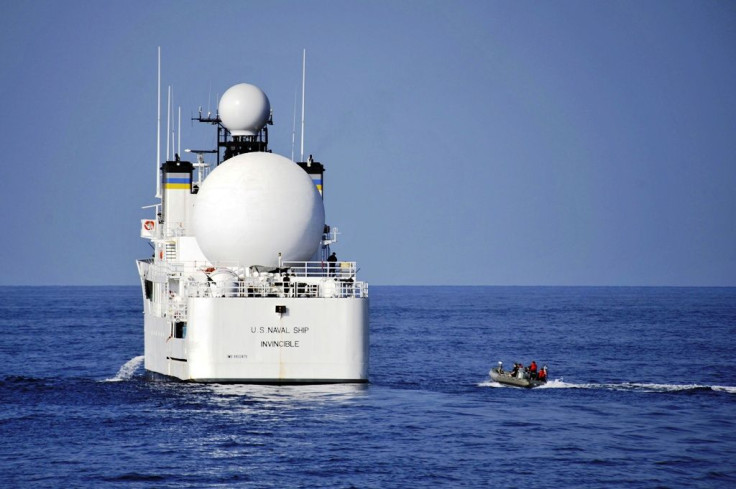Will Iran Go To War With US? USNS Invincible Spy Ship Incident Blamed On Washington As Tehran Warns Of ‘Irreversible Consequences’

Iranian navy Commander Mehdi Hashemi blamed the U.S. for the weekend’s incident that involved a U.S. Navy ship and Tehran’s vessels, Iranian media reported Wednesday. On Saturday, the USNS Invincible spy ship was forced to change its course after Revolutionary Guard’s fast-attack vessels sailed in close proximity in the Strait of Hormuz.
Hashemi also called the incident as “unprofessional and unconventional” and warned Washington of consequences.
"The unprofessional actions of the Americans can have irreversible consequences," Hashemi said, according to Iran’s Mehr News Agency. “The ship’s unprofessional and unconventional conduct in deviating from its main path toward IRGC [Islamic Revolutionary Guard Corps] speed boats in the Strait of Hormuz would have far-reaching consequences; their presence in the Persian Gulf threats the security of world energy path, and their approaching up to distance of 550 meters would fuel the tension in the region.”
A U.S. official told Reuters Monday that the Revolutionary Guard vessels sailed within 600 yards of the USNS Invincible spy ship. The official called the Iran's move as “unsafe and unprofessional” and attempts to contact the Iranian vessel by radio were not successful.
There have been several such incidents in the Strait of Hormuz in recent months. In January, a U.S. Navy destroyer fired warning shots at Iranian patrol boats, which sailed toward it in the strait. In November 2016, an Iranian vessel was reported to have pointed a gun at a U.S. Navy helicopter.
Also in January, Iran carried out a ballistic missile test triggering concern. The U.S. said at the time that it is considering imposing fresh sanctions on Tehran. President Donald Trump also warned the country it had been “put on notice.”
“I think it is now time for the Congress to take Iran on directly in terms of what they’ve done outside the nuclear program,” Sen. Lindsey Graham, a member of the Senate Armed Services Committee, said last month at a panel discussion at the Munich Security Conference.
However, Iran’s Foreign Minister Mohammed Javad Zarif shot back saying that imposing sanctions on the country will not get any results.
© Copyright IBTimes 2025. All rights reserved.






















